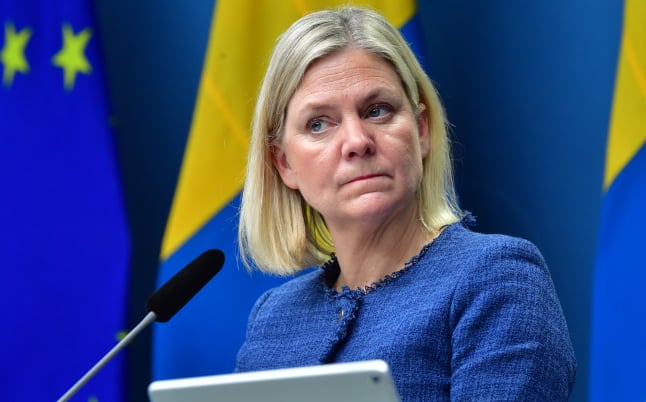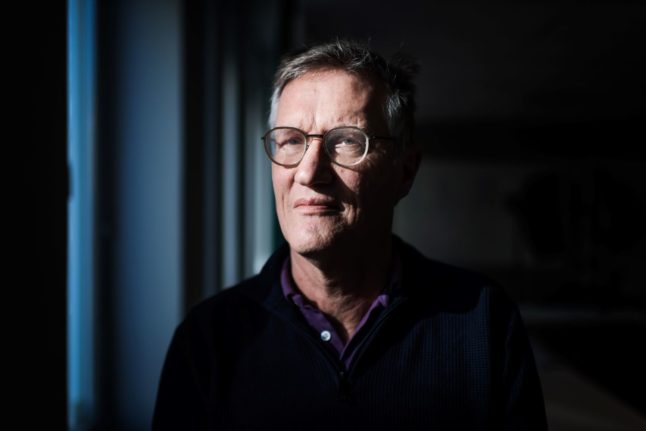From December 8th, employers should enable staff to work from home (universities may continue on-campus teaching, but should avoid large gatherings), adults should keep a distance in public spaces, restaurants should take measures to avoid crowding, and face masks should be worn on public transport, according to the new recommendations, outlined at a government press conference on Tuesday.
Health Minister Lena Hallengren said that the government would also put a proposal to parliament to extend Sweden’s Covid-19 vaccine pass scheme to other venues such as restaurants and gyms. Under the current rules, a valid Covid-19 vaccine pass is only required on the border and at large public events which don’t have other infection measures, such as distancing or a limit on groups of people, in place.
The new vaccine pass proposal will need to first go through all the steps of Sweden’s legislative process, which means that it will first be sent out for consultation (during which organisations and the public will get a chance to comment on it) before it can come into force – a process likely to take some ten days. Hallengren added that this measure will only be rolled out if the current outbreak continues to get even worse.
EXPLAINED:
The government will also again foot the bill for Sweden’s normally unpaid first day of sick leave (karensdag), in order to encourage more people to stay at home and not go to work if they have Covid-19 symptoms, said new Finance Minister Mikael Damberg.
Sweden’s 14-day incidence rate stood at 184 new Covid-19 infections per 100,000 people in the week starting November 22nd, up from 125 the previous week, according to the latest data provided by the European Centre for Disease Prevention and Control. The country has recorded more than 1.2 million confirmed cases of the virus since the start of the pandemic.
“In some European countries they’re seeing a very concerning development with a high spread of infection and an increased burden on the healthcare sector. We are not at that stage in Sweden today. We’re seeing an increased spread of infection but still at low levels,” said new Social Democrat Prime Minister Magdalena Andersson, but added that it was crucial to act now to keep the rise in new infections down.
“Everyone needs to do their part. There are easy things that everyone can and should do. The single most important thing is to get vaccinated. If you belong to a risk group you should get the third dose if you haven’t already. But if you for some reason haven’t got vaccinated at all yet, it is time to do so now and as fast as humanly possible,” said Andersson.
She urged everyone who isn’t fully vaccinated to take extra care to observe the Public Health Agency’s guidelines for people who aren’t vaccinated, which include being extra careful to keep a distance and avoid contact with others even if you don’t have symptoms.
“This is very important at this stage,” she stressed, and also urged those who are vaccinated to be extra cautious, especially when meeting people whose vaccination status is unclear. “Take a break from hugging people if you aren’t absolutely sure that they are vaccinated.”
- KEY POINTS: What are Sweden’s new Covid-19 recommendations?
The government presented the new measures as part of a three-step plan to curb the fourth wave of the pandemic in Sweden.
The first step, outlined above at the start of this article and in more depth via this link, comes into effect tomorrow.
Step two may include rolling out vaccine passes to restaurants as well as smaller public events (it is currently only used at events of more than 100 attendees) that do not have other infection control measures in place to limit crowding. It may also include urging more people work from home unless their presence at the office is essential, and moving back to a hybrid model of distance teaching at universities. This step will only be rolled out if there is a “significant increase” in spread of infection, alongside “increased pressure on healthcare services”.
Step three will come into effect if there is a “very high” spread of infection, as well as a “very high pressure on healthcare services”. It includes for example shifting to part-online teaching in high schools too, limiting opening times for bars and restaurants and tightening vaccine pass rules for these venues, and telling adults to limit the number of people they have close contact with.
You can read the government’s three-step plan (in Swedish) here, or The Local’s explanation in English here.



 Please whitelist us to continue reading.
Please whitelist us to continue reading.
I would love to hear that not only the government talking about “limiting distance to 1.67 meters from each other, vaccine passes for rollercoaster rides, recommending eating with closed mouth and taking 11th booster” but also “how can we make our healthcare system better and treat health staff better, how to take care of these important people, especially now when they are really overburdened.
I’m all for making the health care system better and improvements in how we treat our staff, but they are not ‘really overburdened’ right now. Hospital admissions remain low and ICU occupancy is below normal levels for a baseline 2016-2019 (i.e. before covid) — (source Svenska Intensivvårds registrerat)
I really hope Sweden does not go the way of the rest of the world. Coming here felt like a heavy burden lifted.
You accept the overwhelming scientific evidence that vaccination reduces drastically the spread, right? If so, any further restriction based on that is just the natural way to go
‘overwhelming scientific evidence that vaccination reduces drastically the spread’ you are joking right?
The only thing that is overwhelming is just how useless this vaccine is and how detrimental it is to your health! Even Dr Robert Malone agrees, and he is one of the creators of MRNA technology, look him up, don’t just blindly parrot what you’ve read in the media..
Anything on the Vaccine pass for foreigners who can’t get person numbers who were vaccinated in Sweden? Didn’t think almost 6 months after my second dose I’d be excluded from social life in Sweden and having to quarantine for ten days on my trip to the UK at the end of this month.